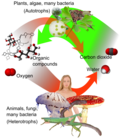An autotroph is an organism that can convert abiotic sources of energy into energy stored in organic compounds, which can be used by other organisms....
19 KB (2,041 words) - 17:03, 8 November 2024
of nutrition (trophic levels), the other being autotrophs (auto = self, troph = nutrition). Autotrophs use energy from sunlight (photoautotrophs) or oxidation...
28 KB (2,963 words) - 13:47, 23 August 2024
Photoautotroph (redirect from Phototrophic autotroph)
Photoautotrophs are organisms that can utilize light energy from sunlight and elements (such as carbon) from inorganic compounds to produce organic materials...
7 KB (690 words) - 22:41, 15 October 2024
anabolic processes of ATP synthesis (in heterotrophs) or biosynthesis (in autotrophs). The electron or hydrogen donors are taken up from the environment. Organotrophic...
19 KB (1,636 words) - 13:31, 17 June 2024
Chemotroph (redirect from Chemotrophic autotroph)
A chemotroph is an organism that obtains energy by the oxidation of electron donors in their environments. These molecules can be organic (chemoorganotrophs)...
9 KB (806 words) - 13:36, 19 October 2024
chain is a linear network of links in a food web, often starting with an autotroph (such as grass or algae), also called a producer, and typically ending...
18 KB (2,034 words) - 12:22, 7 November 2024
responsible for primary production are known as primary producers or autotrophs, and form the base of the food chain. In terrestrial ecoregions, these...
44 KB (5,073 words) - 18:25, 4 November 2024
of obtaining energy, some 99% of flowering plants are photosynthetic autotrophs, deriving their energy from sunlight and using it to create molecules...
80 KB (6,328 words) - 06:14, 11 November 2024
September 1982). "Microbiology of thiobacilli and other sulphur-oxidizing autotrophs, mixotrophs and heterotrophs". Philosophical Transactions of the Royal...
99 KB (11,016 words) - 14:18, 8 November 2024
(previously The Producers), an English supergroup Producer (biology) or autotroph, an organism that synthesizes energy-rich organic compounds The Producers...
2 KB (321 words) - 20:02, 19 September 2024
different population. A consumer is a heterotroph and a producer is an autotroph. Like sea angels, they take in organic moles by consuming other organisms...
5 KB (597 words) - 05:11, 17 November 2024
broadly categorized as autotrophs (or primary producers), heterotrophs (or consumers), and Detritivores (or decomposers). Autotrophs are organisms that produce...
210 KB (21,521 words) - 11:27, 21 October 2024
phototroph abundance, from September 1997 to August 2000. As an estimate of autotroph biomass, it is only a rough indicator of primary production potential...
63 KB (6,950 words) - 22:30, 28 October 2024
or trophic level, is used in ecology to broadly classify organisms as autotrophs or heterotrophs. This is a non-binary classification; some organisms (such...
82 KB (8,605 words) - 01:06, 24 October 2024
phototroph abundance, from September 1997 to August 2000. As an estimate of autotroph biomass, it is only a rough indicator of primary production potential...
53 KB (6,004 words) - 17:59, 6 November 2024
have led to symbiogenesis that gave rise to eukaryotes and eukaryotic autotrophs such as green and red algae. The earliest predators were microorganisms...
20 KB (2,004 words) - 20:09, 3 November 2024
the molecular energy currency for the cell. Phototrophs can be either autotrophs or heterotrophs. If their electron and hydrogen donors are inorganic compounds...
8 KB (740 words) - 06:42, 16 August 2024
lepidopteran species have formed a network of trophic relationships between autotrophs and heterotrophs, which are included in the stages of Lepidoptera larvae...
155 KB (16,853 words) - 09:07, 15 November 2024
CODH/acetyl-coenzyme A synthase in LUCA could be compatible not only with being an autotroph but also with life as a mixotroph or heterotroph. Weiss et al. 2018 reply...
63 KB (6,605 words) - 12:24, 8 November 2024
without being continuously replenished by the photosynthetic activities of autotrophs such as cyanobacteria, chloroplast-bearing algae and plants. A much rarer...
115 KB (11,930 words) - 07:22, 28 October 2024
formal-grammar concept Primary production, the production of new biomass by autotrophs in ecosystems Productivity (ecology), the wider concept of biomass production...
2 KB (187 words) - 12:45, 16 September 2024
recycling organic matter back into a simpler form that plants and other autotrophs may absorb once again. This cycling of matter is known as the biogeochemical...
30 KB (3,100 words) - 18:02, 17 November 2024
Aeroplankton Algaculture Algal mat Algal nutrient solutions Artificial seawater Autotrophs Biological pump Diel vertical migration Dimethylsulfoniopropionate f-ratio...
62 KB (6,468 words) - 16:07, 31 October 2024
discover the phenomenon of chemosynthesis. Primary nutritional groups Autotroph Heterotroph Photosynthesis Movile Cave Julian Chela-Flores (2000): "Terrestrial...
12 KB (1,202 words) - 13:46, 26 June 2024
within any food web, with the lowest level being the primary producers (or autotrophs) such as plants and algae that convert energy and inorganic material into...
133 KB (13,837 words) - 17:58, 9 November 2024
plausible, almost all closed ecological systems to date are based on an autotroph such as green algae. A closed ecological system for an entire planet is...
4 KB (504 words) - 10:35, 23 June 2024
closely related to the family Thioalkalibacteraceae of halophilic obligate autotrophs with distinct morphological and genomic features. Kelly, Donovan P.; Wood...
2 KB (121 words) - 23:46, 3 January 2024
that obtain nutrients by consuming the carbon of other organisms, while autotrophs are organisms that produce their own nutrients from the carbon of inorganic...
36 KB (4,032 words) - 22:56, 10 November 2024
molecules as their source of electrons to support growth; some species are autotrophs. The genus Thiobacillus was previously considered to be a member in this...
5 KB (581 words) - 08:44, 2 November 2024
Carbon source (biology) (section Autotrophs)
organic molecules as a source of both carbon and energy. In contrast, autotrophs may use inorganic materials as a source for both, such as inorganic chemical...
2 KB (481 words) - 09:12, 5 January 2024




















